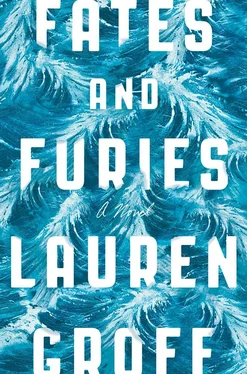Irritation bristled in Lancelot. Who was this one-note show-off, and what gave him the right to spit at the way other people chose to live their lives? Lancelot loved his circle of hell!
“Let’s not patronize the wives of the world, shall we?” he said. Laughter. “Sometimes people who create are so narcissistic we assume that our way of living is the jewel in the crown of humanity. But most playwrights I know are asinine codpieces”—assenting roar from the codger—“and the wives are far better human beings. They are kinder, more generous, more worthy all around. There’s a nobility in making life smooth and clean and comfortable. It’s a choice at least equal to the choice of navel-gazing for a living. The wife is the dramaturge of the marriage, the one whose work is essential to what is produced, even if her contributions are never directly recognized. There is glory in this role. My wife, Mathilde, for instance, gave up her job years ago to make mine run more smoothly. She loves to cook and clean and edit my work, it makes her happy to do these things. And what piece of jerk chicken would condescend to say that she was lesser for not being the creator in the family?”
He was pleased with how smoothly the words seemed to exit his mouth. He thanked the powers that be for his glibness. [Nothing to do with it.]
Tartly, from the girl playwright: “I have a wife and I am a wife. I’m not comfortable with the gender essentialism I’m hearing here.”
“I mean, of course, wife in the genderless sense of helpmeet,” Lancelot said. “There are male wives. When I was an actor, I was so underemployed that I basically did all the housework myself while Mathilde earned the dough. [He did the dishes; that part was true.] Anyway, there is an essential difference in genders that isn’t politically correct to mention these days. Women are the ones to bear the children, after all, they are the ones to nurse, they are the ones, traditionally, who care for the infants. That takes a huge amount of time.”
He smiled, waiting for the applause, but something had gone wrong. There was a cold silence from the crowd. Someone was talking in a loud voice at the back of the auditorium. What had he done? He looked down in panic at Mathilde, who was staring at her shoes.
The girl playwright scowled at Lancelot and said, enunciating very crisply, “Did you just say that women aren’t creative geniuses because they have babies?”
“No,” he said. “Goodness, no. Not because . I wouldn’t say that. I love women. And not all women have babies. My wife, for one. At least not yet. But listen, we’re all given a finite amount of creativity, just like we’re given a finite amount of life, and if a woman chooses to spend hers on creating actual life and not imaginary life, that’s a glorious choice. When a woman has a baby, she’s creating so much more than just a made-up world on the page! She’s creating life itself, not just a simulacrum. No matter what Shakespeare did, it’s so much less than your average illiterate woman of his age who had babies. Those babies were our ancestors, necessary to make everyone here today. And nobody could seriously argue that any play is worth a single human life. I mean, the history of the stage supports me here. If women have historically demonstrated less creative genius than men, it’s because they’re making their creations internal, spending the energies on life itself. It’s a kind of bodily genius. You can’t tell me that that isn’t at least as worthy as genius of imagination. I think we can all agree that women are just as good as men — better, in many ways — but the reason for the disparity in creation is because women have turned their creative energies inward, not outward.” The murmurs had turned angrier. He listened, astonished, and heard only a very small smattering of applause. “What?” he said.
The codger jumped in to agree, giving such a long, convoluted, self-regarding story that name-dropped Liam Neeson and Paul Newman and the Isle of Wight that Lancelot’s cold sweat dried and the pulse in his gut calmed down. He looked again for Mathilde, hoping to catch her eye and comfort himself in her, but where she had been sitting was an empty seat.
There was an enormous crack in the world. Lancelot was teetering. Mathilde had left. Mathilde had stood and walked out of the auditorium publicly. Mathilde was so angry she’d had enough. Enough what? Forever enough? Maybe, when she emerged into the astringent light of Palo Alto, she felt the sun on her face and realized the truth: that she was far better off without him, that she, a saint, was only being dragged down for the dog crotte of a husband he was. His hands itched to call her. For the rest of the discussion, the younger two panelists and the moderator declined to look at Lancelot, which was for the best anyway, because it took all his concentration to stay in his chair. He sat in his discomfort until the end, and when there was the meet-and-greet afterward, he said to the moderator, “I may skip the cheese and crackers just now. Don’t want to get my head handed to me,” and the moderator winced and said, “Might be a good call.” Lancelot sped to the green room to look for Mathilde, but she wasn’t there. And there was such a tsunami of people pouring out now into the hallway that he darted into a private handicapped bathroom to call her, but though her phone rang and rang, she didn’t answer. He listened to the crowd noise outside intensify, then gradually diminish.
He spent a long time looking at himself in the mirror: the forehead so huge he was wearing his own billboard, the strange nose that seemed to be growing as he aged, the fine hairs on the lobes of his ears an inch long when uncurled. All this time and he’d been carrying around his ugliness as confidently as if it were beauty. How strange. He played a game of solitaire on his phone. Then about fifteen more games of solitaire, calling Mathilde between each. The phone made an ignominious bleep and died. His gut spoke to him, and he remembered he hadn’t eaten since breakfast in the hotel in San Francisco and that there was supposed to have been a lunch, and he thought of the usual bitter iced tea and chocolate torte for dessert, but his heart quailed, and as it was somewhere near three o’clock already, the lunch was long over. He poked his head out into the corridor, where there had been crowds milling when he went into the bathroom, but it was empty. He slid along the wall and poked his head around the corner to look, but the way to the front door was clear as well.
He walked out and stood looking at the piazza where students with giant backpacks beetled on their way to world dominance. The wind felt lovely on his face.
“For shame,” said a voice to his right, and he slid his eyes toward a woman: desiccated head covered thinly with dyed black hair. “To think I’ve always loved your work, too. I wouldn’t have paid for a single ticket if I knew you were such a misogynist.”
“I’m not a misogynist! I love women,” Lotto said, and she snorted and said, “That’s what all misogynists say. You just love to pork women.”
It was no use. He did love to pork women, even if he’d porked only one since matrimony. He sped away along the stucco wall, darting under the shadows and through the copses of eucalyptus, berries crunching underfoot, stepping out confusedly on a street called El Camino Real. He was feeling the opposite of royal. He took the road in the vague direction of San Francisco. He sweated through his shirt, the sun far hotter than he’d thought. The street was endless and he was light-headed. He wandered through a neighborhood with odd little split-levels behind palatial gates, pink oleander, cactus gardens. He came to another great road and crossed the street to a cafeteria-style Mexican restaurant, where, surely, he could buy some sustenance and get his druthers back, and he ate half of his chile relleno burrito while waiting in the line to pay. He was still chewing when he dug in his pocket for his wallet. With a leap of fear, he remembered he’d left it in the hotel room. He never had to pay for a thing on these jaunts, and if he did, Mathilde was there with her purse, and frankly, he hated the way wallets made his buttocks look as if they were sporting a huge canker. He preferred the sleek profile of the walletless rear.
Читать дальше












